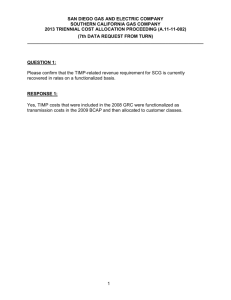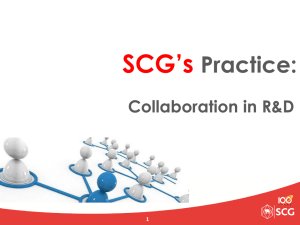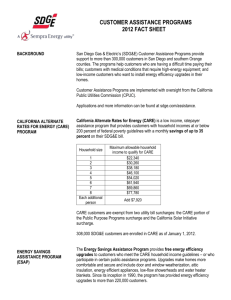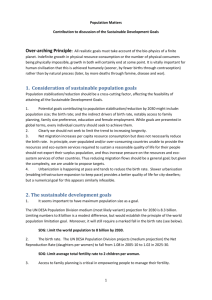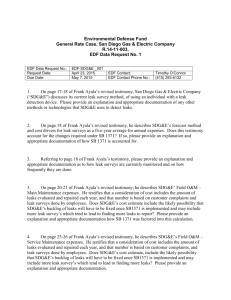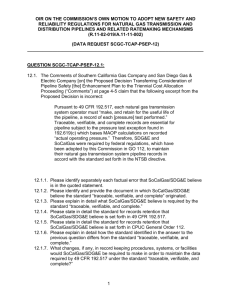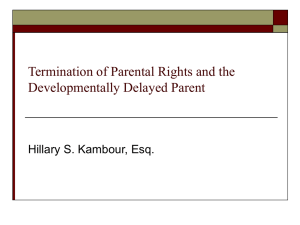ORA-TCAP-SCG-04 - Southern California Gas Company
advertisement
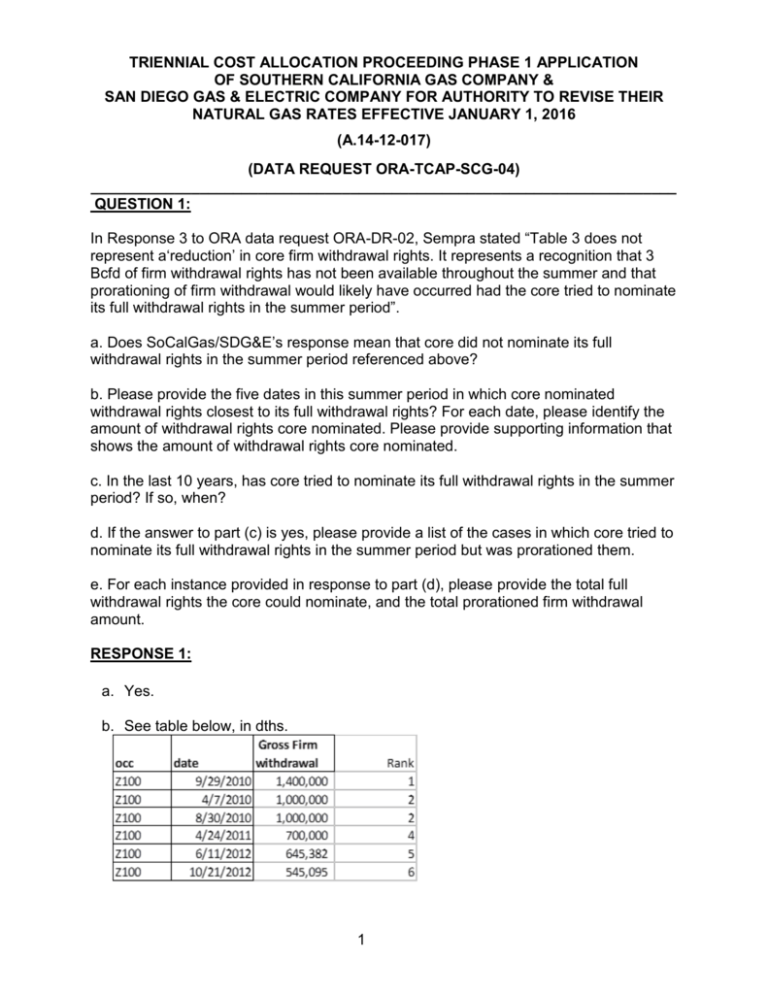
TRIENNIAL COST ALLOCATION PROCEEDING PHASE 1 APPLICATION OF SOUTHERN CALIFORNIA GAS COMPANY & SAN DIEGO GAS & ELECTRIC COMPANY FOR AUTHORITY TO REVISE THEIR NATURAL GAS RATES EFFECTIVE JANUARY 1, 2016 (A.14-12-017) (DATA REQUEST ORA-TCAP-SCG-04) ______________________________________________________________________ QUESTION 1: In Response 3 to ORA data request ORA-DR-02, Sempra stated “Table 3 does not represent a‘reduction’ in core firm withdrawal rights. It represents a recognition that 3 Bcfd of firm withdrawal rights has not been available throughout the summer and that prorationing of firm withdrawal would likely have occurred had the core tried to nominate its full withdrawal rights in the summer period”. a. Does SoCalGas/SDG&E’s response mean that core did not nominate its full withdrawal rights in the summer period referenced above? b. Please provide the five dates in this summer period in which core nominated withdrawal rights closest to its full withdrawal rights? For each date, please identify the amount of withdrawal rights core nominated. Please provide supporting information that shows the amount of withdrawal rights core nominated. c. In the last 10 years, has core tried to nominate its full withdrawal rights in the summer period? If so, when? d. If the answer to part (c) is yes, please provide a list of the cases in which core tried to nominate its full withdrawal rights in the summer period but was prorationed them. e. For each instance provided in response to part (d), please provide the total full withdrawal rights the core could nominate, and the total prorationed firm withdrawal amount. RESPONSE 1: a. Yes. b. See table below, in dths. 1 TRIENNIAL COST ALLOCATION PROCEEDING PHASE 1 APPLICATION OF SOUTHERN CALIFORNIA GAS COMPANY & SAN DIEGO GAS & ELECTRIC COMPANY FOR AUTHORITY TO REVISE THEIR NATURAL GAS RATES EFFECTIVE JANUARY 1, 2016 (A.14-12-017) (DATA REQUEST ORA-TCAP-SCG-04) ______________________________________________________________________ c. No, the core has not tried to nominate its full withdrawal rights in the summer period. Please note that SoCalGas does not have similar data over the last 10 years as Gas Acquisition did not schedule gas like other customers until mid-2009. d. No prorationing of summer rights occurred over the 2010-2014 period. e. N/A 2 TRIENNIAL COST ALLOCATION PROCEEDING PHASE 1 APPLICATION OF SOUTHERN CALIFORNIA GAS COMPANY & SAN DIEGO GAS & ELECTRIC COMPANY FOR AUTHORITY TO REVISE THEIR NATURAL GAS RATES EFFECTIVE JANUARY 1, 2016 (A.14-12-017) (DATA REQUEST ORA-TCAP-SCG-04) ______________________________________________________________________ QUESTION 2: Question 9 of ORA data request ORA-DR-02 asked for historical data related to Table 3: Storage Allocations (Watson testimony, page 10, line 14). Sempra responded “Table 3 is a proposed future definition and allocation of firm rights. Such a table cannot be ‘backcast’”. a. Please provide annual historical data from 2010-2014 similar in format of the above mentioned table. Specifically, provide firm injection and withdrawal figures in MMcf/d for winter and summer for unbundled, core, and balancing functions; provide the total and an explanation if the total does not equal exactly to the sum of the three functions. b. If firm injection capacity from 2010 to 2014 was previously allocated to storage functions other than ‘balancing’, ‘core’, and ‘unbundled’, please replace the row headings of ‘unbundled’, ‘core’, and ‘balancing’ in the table with the name of the previous functions. Please ensure that the table still shows firm injection and withdrawal figures in MMcf/d as Table 3 in Watson testimony, page 10, line 14 does. Please also provide definitions for each of these functions. c. If firm injection capacity from 2010 to 2014 has been previously allocated over different time/season periods than ‘winter’ and ‘summer’, please state each such period. Please also define the duration of each such period. Please replace the column headings of ‘winter’ and ‘summer’ in the table with these terms. Please ensure that the table still shows firm injection and withdrawal figures in MMcf/d as Table 3 in Watson testimony, page 10, line 14 does. d. If data from the system used previously is completely incomparable to data in Table 3, please provide a detailed written explanation of the previously-used system and data on how firm capacity was previously allocated and recorded. RESPONSE 2: a. – d. phase1settle.pdf 3 TRIENNIAL COST ALLOCATION PROCEEDING PHASE 1 APPLICATION OF SOUTHERN CALIFORNIA GAS COMPANY & SAN DIEGO GAS & ELECTRIC COMPANY FOR AUTHORITY TO REVISE THEIR NATURAL GAS RATES EFFECTIVE JANUARY 1, 2016 (A.14-12-017) (DATA REQUEST ORA-TCAP-SCG-04) ______________________________________________________________________ The data is not comparable. The fixed annual capacity figures were adopted through the attached Settlement Agreement adopted in D.09-11-006. Total annual capacities were set in paragraph 4. Core capacities were set in paragraphs 5 and 6. Balancing capacities were set in paragraph 9. Unbundled storage capacities were set in paragraph 12. The parties adopted the capacities suggested in Phase 2 testimony of Steve Watson in A.08-02-001, which was redlined pursuant to the aforementioned Settlement Agreement. In addition, the parties agreed to expand inventory at Honor Rancho and injection capacity at Aliso Canyon—as discussed in the Settlement Agreement documents. WATSON-TEST-RED LINED.doc 4 TRIENNIAL COST ALLOCATION PROCEEDING PHASE 1 APPLICATION OF SOUTHERN CALIFORNIA GAS COMPANY & SAN DIEGO GAS & ELECTRIC COMPANY FOR AUTHORITY TO REVISE THEIR NATURAL GAS RATES EFFECTIVE JANUARY 1, 2016 (A.14-12-017) (DATA REQUEST ORA-TCAP-SCG-04) ______________________________________________________________________ QUESTION 3: In Response 11 of ORA data request ORA-DR-02, Sempra stated “SoCalGas is unable to backcast what net unbundled storage revenues (and the associated shareholder and ratepayer amounts) might have been under a 60/40 sharing mechanism.” a. Would SCG and SDG&E agree that to determine a 60/40 split, one must multiply the amount in question by 0.6 and 0.4, respectively? b. If the answer to question 3a is yes, would SCG and SDG&E agree that this would result in the following table, assuming unchanged past revenues? If not, please explain and provide a table formatted in the same fashion as the one immediately below with all of the values filled in. Year 2008 2009 2010 2011 2012 2013 2014 Sum Net Revenues ($M) $43.9 $58.2 $48.6 $24.4 $19.6 $5.6 $0.0 $200.3 $M to Shareholders $17.56 $20.00* $19.44 $9.76 $7.84 $2.24 $0.00 $76.8 $M to Ratepayers $26.34 $38.20 $29.16 $14.64 $11.76 $3.36 $0.00 $123.5 *shareholder cap reached, additional revenues to ratepayers c. Would SCG and SDG&E agree that a similar table taking into account positive or negative growth could be formed by multiplying some starting amount by (1 + (growth rate)) in each subsequent year? If not, please explain. RESPONSE 3: a. Yes b. Yes, given the assumption that revenues would be unchanged in a 60/40 mechanism relative to current sharing mechanism, SoCalGas believes this table provides a reasonable estimate of sharing under a 60/40 sharing mechanism. However, SoCalGas believes that total net revenues would have been higher than the $200 million shown in the above table (especially in the 2011-2014 period) under a 60/40 mechanism, resulting in higher benefits to both 5 TRIENNIAL COST ALLOCATION PROCEEDING PHASE 1 APPLICATION OF SOUTHERN CALIFORNIA GAS COMPANY & SAN DIEGO GAS & ELECTRIC COMPANY FOR AUTHORITY TO REVISE THEIR NATURAL GAS RATES EFFECTIVE JANUARY 1, 2016 (A.14-12-017) (DATA REQUEST ORA-TCAP-SCG-04) ______________________________________________________________________ shareholders and ratepayers than shown in this table. Conversely, SoCalGas believes that total net revenues would have been lower than $200 million if there had been complete balancing account treatment. c. It is not clear how one would come up with growth/decline factors for various incentive mechanism levels. Furthermore, those factors could not be applied to the net revenue column, since the incentive mechanisms only affect revenues, not costs. 6 TRIENNIAL COST ALLOCATION PROCEEDING PHASE 1 APPLICATION OF SOUTHERN CALIFORNIA GAS COMPANY & SAN DIEGO GAS & ELECTRIC COMPANY FOR AUTHORITY TO REVISE THEIR NATURAL GAS RATES EFFECTIVE JANUARY 1, 2016 (A.14-12-017) (DATA REQUEST ORA-TCAP-SCG-04) ______________________________________________________________________ QUESTION 4: In Response 11 of ORA data request ORA-DR-02, Sempra stated “Directionally, net storage revenues would have been higher under the 60/40 mechanism than under the current mechanism – especially in the last few years.” Please explain how and from what data this conclusion was drawn, and provide all information or data demonstrating a causal effect between incentive mechanism and net unbundled storage revenues. If SCG/SDG&E has no information supporting this conclusion, please state as such. RESPONSE 4: The assertion is based on the position that incentives are used to motivate innovation and hard work. The larger the incentives are, the stronger the impact of those incentives. 7 TRIENNIAL COST ALLOCATION PROCEEDING PHASE 1 APPLICATION OF SOUTHERN CALIFORNIA GAS COMPANY & SAN DIEGO GAS & ELECTRIC COMPANY FOR AUTHORITY TO REVISE THEIR NATURAL GAS RATES EFFECTIVE JANUARY 1, 2016 (A.14-12-017) (DATA REQUEST ORA-TCAP-SCG-04) ______________________________________________________________________ QUESTION 5: In reference to the “creative product marketing” for unbundled gas storage referenced in Ms. Marelli’s testimony (Marelli testimony, pages 1-2, lines 23 and 1, respectively): a. Do SCG and SDG&E currently have (or have they had in the last 10 years) any marketing programs (creative or not) related to unbundled natural gas storage? If so, please describe their date of creation; purpose, goals or aims; history (i.e. if the program has changed significantly since inception); and scope. b. If the answer to part (a) is yes, do SCG and SDG&E have (or have they had in the last 10 years) any measures, metrics, analyses, or similar devices/programs to measure the effectiveness and/or impact of these marketing programs? c. If the answer to part (b) is yes, please provide the results of these measures, metrics, analyses, or similar devices/programs. d. If the answer to part (a) is yes and if the change to the revenue-sharing requirement were to be approved as requested, would SCG and SDG&E extend or continue these marketing programs? RESPONSE 5: a. No. SoCalGas has a sales staff of two. By creative product marketing SoCalGas is referring to the increasing myriad of storage and Hub products SoCalGas offers, which requires more marketing effort by those sales personnel and by their staff support. b. N/A c. N/A d. N/A 8 TRIENNIAL COST ALLOCATION PROCEEDING PHASE 1 APPLICATION OF SOUTHERN CALIFORNIA GAS COMPANY & SAN DIEGO GAS & ELECTRIC COMPANY FOR AUTHORITY TO REVISE THEIR NATURAL GAS RATES EFFECTIVE JANUARY 1, 2016 (A.14-12-017) (DATA REQUEST ORA-TCAP-SCG-04) ______________________________________________________________________ QUESTION 6: SCG and SDG&E’s testimony (Marelli testimony, page 2, lines 19-21) states “As Mr. Watson explains, due to revolutions in gas production technologies, natural gas price volatility is much lower today than it has been in the past. As a result, shareholder earnings have reduced to just two hundred thousand dollars for the last two years”. a. The above statements imply that low volatility in natural gas prices, resulting from revolutions in gas production technologies, are the sole or dominant cause of a reduction in shareholder earnings from the unbundled storage program. Is this implication accurate? Please explain. b. To what extent do factors other than revolutions in gas production technologies affect natural gas price volatility remaining low? Please explain. c. To what extent do factors other than natural gas price volatility affect net unbundled storage revenues? Please explain. d. If natural gas price volatility stays low or decreases further, to what extent do SCG and SDG&E expect to be able to compensate through “aggressive negotiations with counterparties, creative product marketing, and storage field operations” (Marelli testimony pages 1-2, lines 23 and 1, respectively) in order to increase unbundled storage revenues? RESPONSE 6: a. No. Low price volatility is one factor affecting storage valuations. b. Yes, other factors also affect natural gas volatilities. c. Natural gas prices are another factor. Even for a given volatility level, storage values tend to increase with overall natural gas prices. The price spreads from summer to winter periods are also important. The perceived likelihood of flowing supply shortages/disruptions is another factor. d. Volatility affects the overall value of storage. Aggressive negotiations help determine what percentage of that overall value is retained by SoCalGas and its ratepayers versus the purchaser. 9 TRIENNIAL COST ALLOCATION PROCEEDING PHASE 1 APPLICATION OF SOUTHERN CALIFORNIA GAS COMPANY & SAN DIEGO GAS & ELECTRIC COMPANY FOR AUTHORITY TO REVISE THEIR NATURAL GAS RATES EFFECTIVE JANUARY 1, 2016 (A.14-12-017) (DATA REQUEST ORA-TCAP-SCG-04) ______________________________________________________________________ QUESTION 7: In Response 12 of ORA data request ORA-DR-02, Sempra stated “SoCalGas has no forecasts of unbundled storage revenues for 2016-2021 under any sharing mechanism, nor is it capable of generating such a forecast using its current tools”. a. b. c. Do SCG and/or SDG&E have any forecasts of unbundled storage revenues for any future years? Is it capable of generating any forecasts of unbundled storage revenues for any future years using any tools at its disposal? If so, please explain. If SCG and/or SDG&E cannot generate unbundled storage revenue forecasts, what is SCG/SDG&E’s basis for determining the likelihood of any unbundled storage revenue increase or decrease? RESPONSE 7: a. We are forecasting 2015 revenues similar to 2014: $26.5 million gross, including FF&U. We have no forecasts beyond 2015. b. No. Here are three points why we don’t estimate the value of our storage assets for periods significantly longer than a year: Price Discovery: As you move towards the back of the forward curve traded volumes tend to decline. There is little trading in ICE for individual SoCal Basis monthly contracts with an expiration greater than one year. Determining the correct bid and offer of forward prices in the absence of trading activity is difficult. Uncertainty of Unobserved Inputs: Storage values depend on the expected correlation between different contracts in the forward curve. Because there is no forward markets for correlation in the natural gas market, correlations coefficients have to be estimated using historical data. This assumes that historical data is representative of the future. However the constantly changing nature of the market ensures that the validity of this assumption weakens the further out we go into the future. Appropriateness of the model: Commodity markets often behave differently at different time intervals. At multi-year periods, commodities tend to exhibit mean reversion. If natural gas prices rise, producers increase their drilling activity, new pipelines are built, etc.. This mean reversion is much less pronounced on shorter time periods. Thus, models designed to value annual storage contracts are not be suitable for determining the long term market value of storage. We don’t have a model to estimate the long term value of storage. 10 TRIENNIAL COST ALLOCATION PROCEEDING PHASE 1 APPLICATION OF SOUTHERN CALIFORNIA GAS COMPANY & SAN DIEGO GAS & ELECTRIC COMPANY FOR AUTHORITY TO REVISE THEIR NATURAL GAS RATES EFFECTIVE JANUARY 1, 2016 (A.14-12-017) (DATA REQUEST ORA-TCAP-SCG-04) ______________________________________________________________________ c. Few in the industry expect natural gas prices to rise over the next several years to the price levels and exhibit the price volatility seen in the 2006-2010 period. 11 TRIENNIAL COST ALLOCATION PROCEEDING PHASE 1 APPLICATION OF SOUTHERN CALIFORNIA GAS COMPANY & SAN DIEGO GAS & ELECTRIC COMPANY FOR AUTHORITY TO REVISE THEIR NATURAL GAS RATES EFFECTIVE JANUARY 1, 2016 (A.14-12-017) (DATA REQUEST ORA-TCAP-SCG-04) ______________________________________________________________________ QUESTION 8: SCG and SDG&E’s testimony (Marelli testimony pages 2-3, lines 21-22 and 1-2, respectively) states “Aggressive marketing of our storage assets benefits customers because they are able to share in a larger pot of revenues. The Commission should adopt the Utilities proposed incentive mechanism, which will better align the interests of customers and shareholders, to the ultimate benefit of customers.” Does the above passage of Ms. Marelli’s testimony mean that SCG and SDG&E believe that the basis for benefit to both shareholders and ratepayers of modifying the revenue sharing mechanism is its ability to increase net unbundled storage revenue (regardless of how that increase is achieved)? If not, please explain. RESPONSE 8: Yes. Greater sharing leads to greater revenue, which benefits both shareholders and ratepayers. 12 TRIENNIAL COST ALLOCATION PROCEEDING PHASE 1 APPLICATION OF SOUTHERN CALIFORNIA GAS COMPANY & SAN DIEGO GAS & ELECTRIC COMPANY FOR AUTHORITY TO REVISE THEIR NATURAL GAS RATES EFFECTIVE JANUARY 1, 2016 (A.14-12-017) (DATA REQUEST ORA-TCAP-SCG-04) ______________________________________________________________________ QUESTION 9: SCG and SDG&E’s testimony (Marelli testimony pages 1-2, lines 20-23 and 1, respectively) states: “Revenue-sharing incentives for the unbundled storage program are in the best interest of SoCalGas and SDG&E’s customers because they encourage us to maximize customer benefits from unbundled storage program revenues through aggressive negotiations with counterparties, creative product marketing, and storage field operations” a. Aside from related support or administrative changes, is “aggressive negotiations with counterparties, creative product marketing, and storage field operations” an exhaustive list of programs and changes that SCG and SDG&E would pursue if the 60/40 revenue sharing mechanism was approved as-is? If not, please provide descriptions of all other programs or changes that SCG and SDG&E would implement. b. In addition, please provide implementation details and workpapers related to the programs identified in response to part (a). If none exist, please state to what extent SCG and SDG&E have planned or considered implementing such programs. RESPONSE 9: The list is not exhaustive. Rather, these are examples of the type of things SoCalGas might seek to pursue with a revised sharing mechanism. With greater sharing, SoCalGas would have a strong incentive to pursue programs that would bring in additional unbundled storage revenues. But until the sharing mechanism is revised, it would not make sense for SoCalGas to spend resources developing such programs. 13 TRIENNIAL COST ALLOCATION PROCEEDING PHASE 1 APPLICATION OF SOUTHERN CALIFORNIA GAS COMPANY & SAN DIEGO GAS & ELECTRIC COMPANY FOR AUTHORITY TO REVISE THEIR NATURAL GAS RATES EFFECTIVE JANUARY 1, 2016 (A.14-12-017) (DATA REQUEST ORA-TCAP-SCG-04) ______________________________________________________________________ QUESTION 10: In reference to SCG and SDG&E’s testimony (Watson testimony pages 15-16, lines 1923 and 1- 8, respectively) regarding the elimination of the posting requirement for unbundled storage transaction details: a. What benefit would SCG and SDG&E derive from the elimination of the unbundled storage transaction posting requirement? b.What benefit would shareholders derive from the elimination of the unbundled storage transaction posting requirement? c. What benefit would ratepayers derive from the elimination of the unbundled storage transaction posting requirement? RESPONSE 10: A .Backoffice staff work would be reduced by eliminating an unnecessary requirement. Certain legal/regulatory risks associated with incorrect, late, or incomplete postings are also eliminated. b. It is unclear how the elimination of the deal posting requirement would affect storage revenues. But both ratepayers and shareholders should benefit indirectly through the elimination of unnecessary posting requirements. c. It is unclear how the elimination of the deal posting requirement would affect storage revenues. But both ratepayers and shareholders should benefit indirectly through the elimination of unnecessary posting requirements. 14 TRIENNIAL COST ALLOCATION PROCEEDING PHASE 1 APPLICATION OF SOUTHERN CALIFORNIA GAS COMPANY & SAN DIEGO GAS & ELECTRIC COMPANY FOR AUTHORITY TO REVISE THEIR NATURAL GAS RATES EFFECTIVE JANUARY 1, 2016 (A.14-12-017) (DATA REQUEST ORA-TCAP-SCG-04) ______________________________________________________________________ QUESTION 11: In reference to the unbundled storage transaction posting requirement, SCG and SDG&E’s testimony states: “Since SoCalGas is only able to charge its unbundled storage customers the price they feel is warranted for a particular storage product, the posting of the prices paid by other parties for other products at other times is unnecessary” (Watson testimony, page 16, lines 4-7). Testimony also notes: “Some intervenors have argued for such a requirement since ‘SoCalGas was the only storage provider in Southern California.’” (Watson testimony, pages 15-16, lines 15 and 1-2, respectively). a. Are SCG and SDG&E aware of any other natural gas storage providers in southern California for storage products similar to those offered by SCG and SDG&E? If so, please provide a list of those storage providers. b. Are SCG and SDG&E aware of any other publically-available pricing information in southern California for their storage products or storage products similar to those offered by SCG and SDG&E? If so, please identify such information and provide reference to the source so that ORA can access the information. RESPONSE 11: a. No. But storage competition is not limited to such a small geographic area, and there are substitute products. The price arbitrage opportunities afforded by SoCalGas’ storage—buy low and sell high—can also be obtained with storage from anywhere in the Western U.S. For example, in Exhibit A of PG&E’s Certificate of Public Convenience and Necessity (CPCN) Application (A.08-07033) for the Gill Ranch Storage Project, PG&E included a map showing the companies with whom it is likely to compete. That exhibit included SoCalGas’ storage fields. b. Other than what is provided by SoCalGas, there is no pricing information posted on the internet for any storage in California. This is why SoCalGas believes its peculiar posting requirements should be removed. 15 TRIENNIAL COST ALLOCATION PROCEEDING PHASE 1 APPLICATION OF SOUTHERN CALIFORNIA GAS COMPANY & SAN DIEGO GAS & ELECTRIC COMPANY FOR AUTHORITY TO REVISE THEIR NATURAL GAS RATES EFFECTIVE JANUARY 1, 2016 (A.14-12-017) (DATA REQUEST ORA-TCAP-SCG-04) ______________________________________________________________________ QUESTION 12: ORA data request ORA-DR-02 reads as follows: SCG’s and SDG&E’s testimony states (Watson testimony, pg. 16, lines 2-4) “Without rehashing all the past arguments made on this issue, it should now be obvious that SoCalGas does not have the ability to manipulate prices in the unbundled storage market. If it did, it would be able to generate much greater revenues that it has.” Please provide the relevant quantitative information, assumptions, data sources, and workpapers used to draw this conclusion. If none exist, please describe in detail the process through which this conclusion was drawn. Sempra’s entire response (provided in ORA-DR-02, response 15) to the above question was “The statement is based on Figure 1 in Mr. Watson’s testimony.” Figure 1 in Mr. Watson’s testimony (page 14, line 3) shows unbundled storage revenues plotted as a line graph for the years 2000 through 2014. a. Please explain how Figure 1 alone demonstrates the conclusion quoted in Mr. Watson’s testimony above. b. Does SoCalGas/SDG&E assert that Figure 1 represents a causal relationship between posting requirements and price manipulation? c. If the answer to part (b) is yes, please explain. Please provide all additional quantitative information, assumptions, data sources, and workpapers that were used to draw this conclusion. RESPONSE 12: a. An entity with significant market power would be able to consistently generate revenues well above its costs, year after year. Figure 1 shows that, to the contrary, SoCalGas revenues have at times been well above its costs (in good markets combined with strong incentive mechanism) and has recently been about equal to its costs (in weak markets combined with a weak shareholder incentive mechanism.) b. No. Figure 1 illustrates the point in a. c. N/A 16
